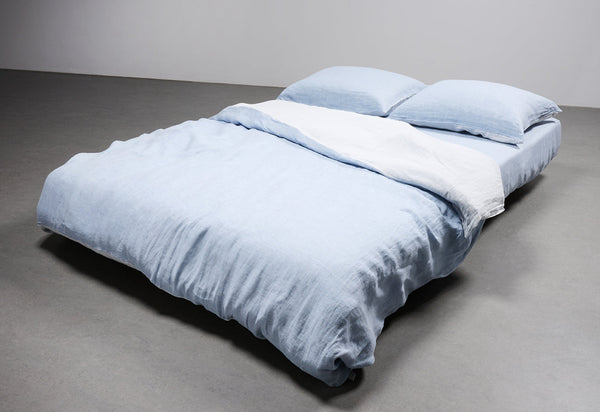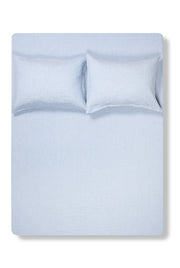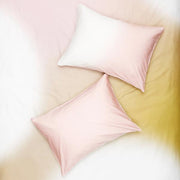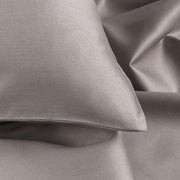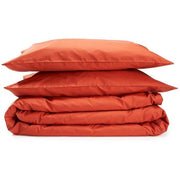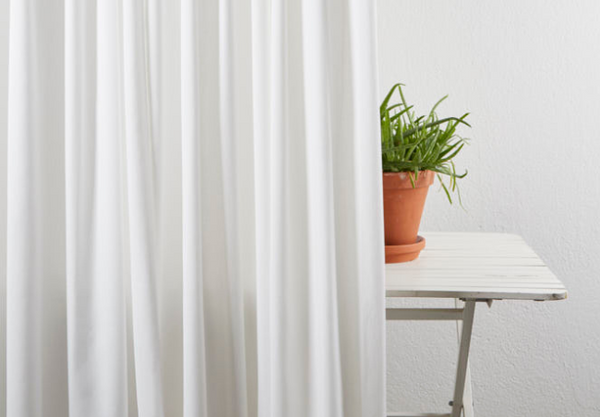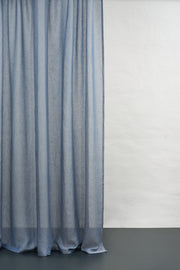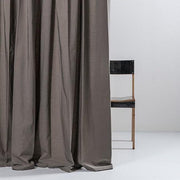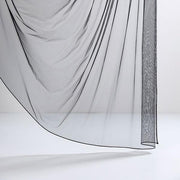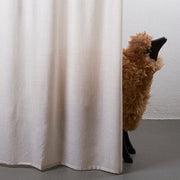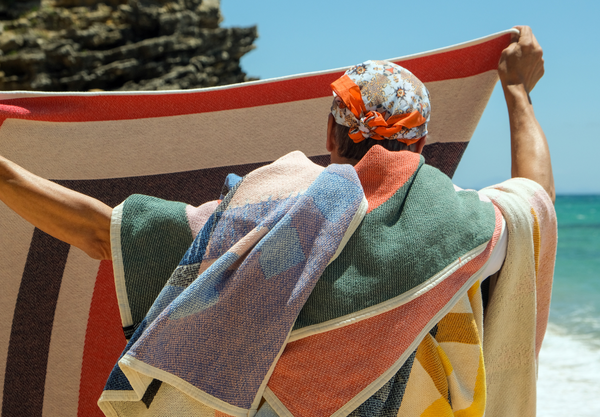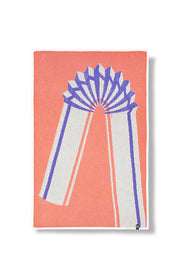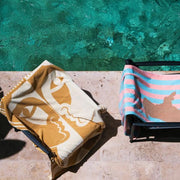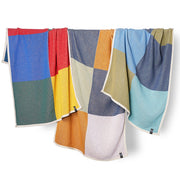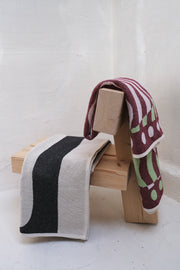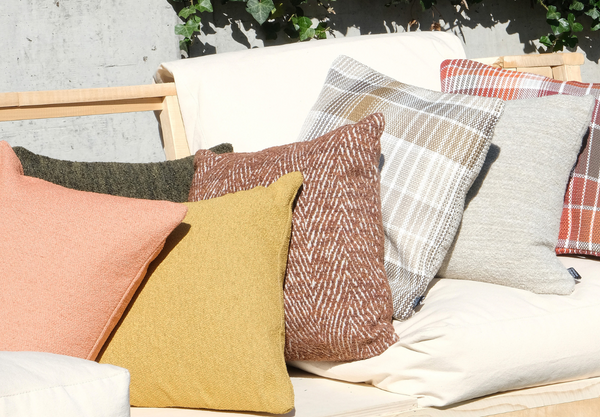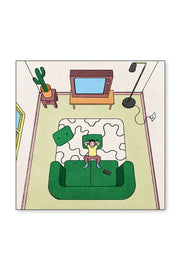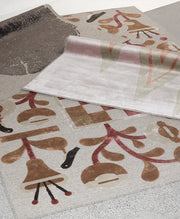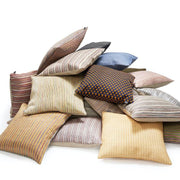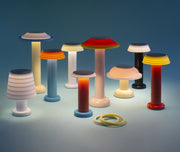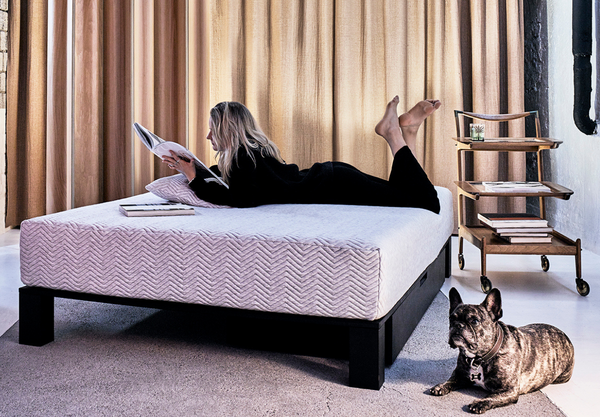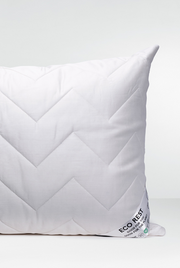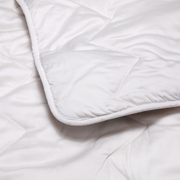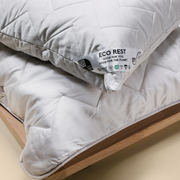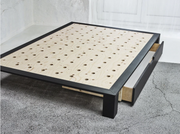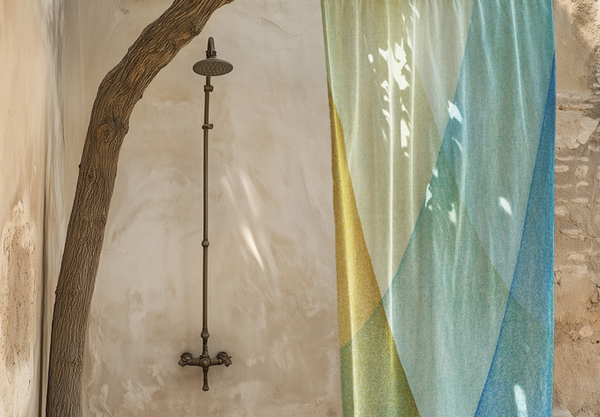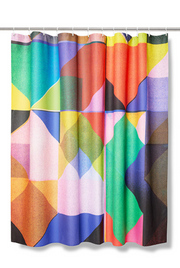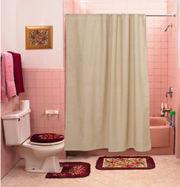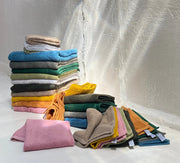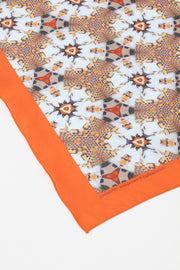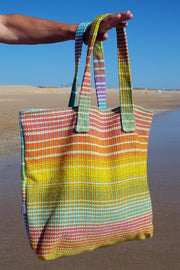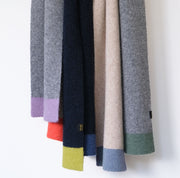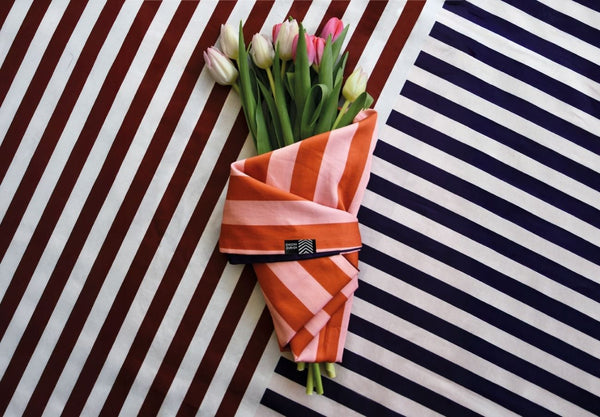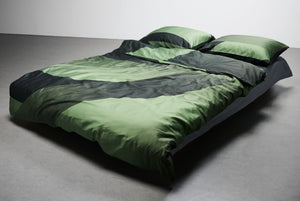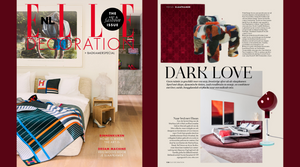The shower curtain material you choose does more than just keep water off the floor. It’s a backdrop that sets the tone for one of the most intimate rooms in your home. The fabric you choose will shape how your bathroom feels, how it functions day-to-day, and even how it interacts with the air you breathe.
As shower curtains are one of the largest visual elements in your bathroom, selecting the right material is crucial. Here’s a look at how the most common shower curtain materials stack up against each other:
| Material | Waterproof? | Machine Washable? | Mold Resistance | Design Potential | Eco-Friendly? |
| Cotton | No (liner needed) | Yes | Low | Good | Good (Organic is best) |
| Linen | No (liner needed) | Yes (gentle) | Good | Excellent | Excellent |
| Polyester | Water-resistant | Yes | Good | Excellent | Varies |
| Vinyl (PVC) | Yes | No (wipe clean) | Moderate | Fair | No |
Best Materials for Shower Curtain Fabric
The fabric you choose for your shower curtain affects how it looks, how long it lasts, and how easy it is to care for. Some materials excel at resisting water and mold, while others focus on texture, drape, and style.
Here’s a closer look at the character and performance of each option:
1. Cotton
There's an undeniable softness and classic appeal to cotton. A cotton shower curtain can elevate a bathroom, giving it a relaxed, spa-like atmosphere. It hangs beautifully, feels substantial, and brings a natural element into a room filled with hard surfaces.
- Pros: Soft and natural to the touch, breathable and absorbent, with a premium look.
- Cons: Needs a waterproof liner, is prone to mold and mildew if not aired out properly, and can wrinkle.
A cotton shower curtain is best for creating a high-end, serene bathroom aesthetic where style is the top priority. This can be achieved with a selection of shower curtains that complement your decor.

Also, cotton is machine washable, but remember to wash it regularly and ensure your bathroom has good ventilation to prevent mildew growth. Tumble dry on low or hang to dry.
2. Linen
Linen is a premium, earth-friendly options that bring a unique, textured elegance to a bathroom. It is highly durable, naturally resistant to microbes, and gets softer with every wash.
- Pros: Extremely durable, naturally antimicrobial and mold-resistant, sustainable, and has a beautiful, earthy texture.
- Cons: Higher cost, wrinkles easily (which can be part of its charm), and requires a liner.
Linen’s beauty lies in its natural texture and effortless drape. Rather than bold prints or bright patterns, linen offers subtle luxury through its organic feel and refined appearance. If you’re looking for a bathroom accent that combines longevity and timeless elegance, linen is a choice that feels as good as it looks.

If you value the environment, favor a natural or minimalist style, or want a lasting bathroom upgrade, a linen shower curtain is an ideal material. Additionally, caring for a linen shower curtain is simple. Just wash it on a gentle cycle with mild detergent and skip complicated routines.
3. Polyester
Polyester is the most common fabric for shower curtains for a reason. It’s a workhorse material that balances cost, durability, and design flexibility better than almost anything else. Because it’s a synthetic fiber, it naturally repels water and resists the wrinkles and shrinking that can plague natural fibers.
- Pros: Durable, affordable, resists wrinkles, quick-drying, and holds vibrant, detailed artistic prints exceptionally well.
- Cons: Not as breathable as natural fabrics, less luxurious texture.
Polyester shower curtains are easy to maintain. You can wash it in the washing machine on a gentle cycle and hang it to dry. It also dries fast, which helps keep mildew at bay. Because of this, polyester shower curtains are suitable for busy family bathrooms and those looking for a low-maintenance solution with a huge variety of design choices.
4. Vinyl (PVC)
Vinyl, specifically PVC (polyvinyl chloride), is one of the most budget-friendly shower curtain materials. It’s completely waterproof and requires minimal effort to clean. However, its affordability comes with notable drawbacks, particularly regarding health and environmental impact.
- Pros: Very inexpensive, 100% waterproof.
- Cons: Releases VOCs and phthalates (that "new shower curtain smell"), which can affect air quality, is not environmentally friendly, and can tear easily.
For situations where practicality and affordability come first, such as short-term apartments or student housing, a PVC shower curtain is a sensible choice. It’s fully waterproof, easy to maintain, and only needs a quick wipe to stay fresh.
How to Choose The Best Shower Curtains
Choosing the right material can have a real effect on your home's air quality and the environment. Here are three ways you can choose the perfect shower curtain for your bathroom:
1. Prioritize Non-Toxic Priority
If avoiding chemicals is your main goal, choose natural fibers like cotton and linen. Avoid PVC whenever possible due to the off-gassing of volatile organic compounds (VOCs).
2. Minimize Your Environmental Impact
Linen is one of the top contenders for sustainability, as it requires less water and fewer pesticides to grow than conventional cotton. Organic cotton is also a great choice. For synthetics, recycled polyester is the clear winner, as it gives new life to post-consumer waste.
3. Check for Safe Textile Certifications
When shopping for fabric curtains, look for an Oeko-Tex Standard 100 label. This is a global, independent certification ensuring the textile has been tested for and cleared of a long list of harmful substances.
Sizes of Shower Curtains
According to our shower curtain size guideline, the standard shower curtain is around 180 x 180 cm (72" x 72"). Other sizes of bathroom curtains are:
- Extra Tall: 180 x 220-240 cm (72" x 84-96")
- Extra Wide: 200-280 x 200 cm (79-110" x 79")
- Shower Stall: 90 x 180 cm (36" x 72")
- Small Tub: 137 x 180 cm (54" x 72")
-
RV Showers: Varies (typically 122-152 x 152-165 cm)
Varies (typically 48-60" x 60-65")
Which Material Is Right for Your Bathroom?
Let's match these shower curtain materials to real-life situations:
- For a Family with Kids: An eco-friendly, easy-care, and non-toxic option makes life simpler and safer. Cotton or linen curtains are gentle on the skin, easy to wash, and free from harmful finishes.
- For a Rental Apartment: When budget and low maintenance matter, a well-made polyester curtain offers a smart balance of price, style, and simple care. This makes it ideal for frequent moves or shared spaces.
- For a Designer or Boutique Bathroom: Texture, drape, and a touch of indulgence can transform the space. A high-quality cotton in a waffle weave or a beautiful linen curtain creates a refined, tactile focal point. Explore some of the most striking options in our collection of designer shower curtains.
- For the Eco-Conscious Home: Prioritize natural or recycled materials. Organic cotton and recycled polyester are your best options. They align a beautiful aesthetic with a commitment to lower environmental impact.
Find the Shower Curtain Material That Transforms Your Bathroom
Choosing a shower curtain material is an opportunity to add a layer of thoughtfulness to your home. By considering how a material performs, how it feels, and where it comes from, you can find a shower curtain that is a source of daily delight and artistic expression.
When you're ready, explore ZigZagZurich shower curtain collections to see how high-quality materials and artist-driven design come together.
Frequently Asked Questions
1. What is the difference between a shower curtain and a liner?
A shower curtain is the decorative outer panel, chosen for its style. A liner is the functional inner panel that is waterproof and protects the outer curtain and your floor from water. Fabric curtains almost always need a liner.
2. Can I use a fabric shower curtain without a liner?
You can, but it's not recommended. Most fabrics, like cotton and linen, are absorbent. Without a liner, they will become saturated, fail to contain water, and be highly susceptible to mildew. Water-resistant fabrics like polyester can sometimes be used without a liner, but pairing them with one extends their life.
3. How often should I clean my shower curtain?
For fabric curtains, a machine wash once a month is a good rule of thumb. For plastic liners and curtains like PEVA, a weekly wipe-down can prevent buildup.
4. What is the most durable shower curtain material?
Hemp and linen are incredibly durable natural fibers that can last for years with proper care. Among synthetics, a good quality polyester is very resilient and resistant to tearing.
